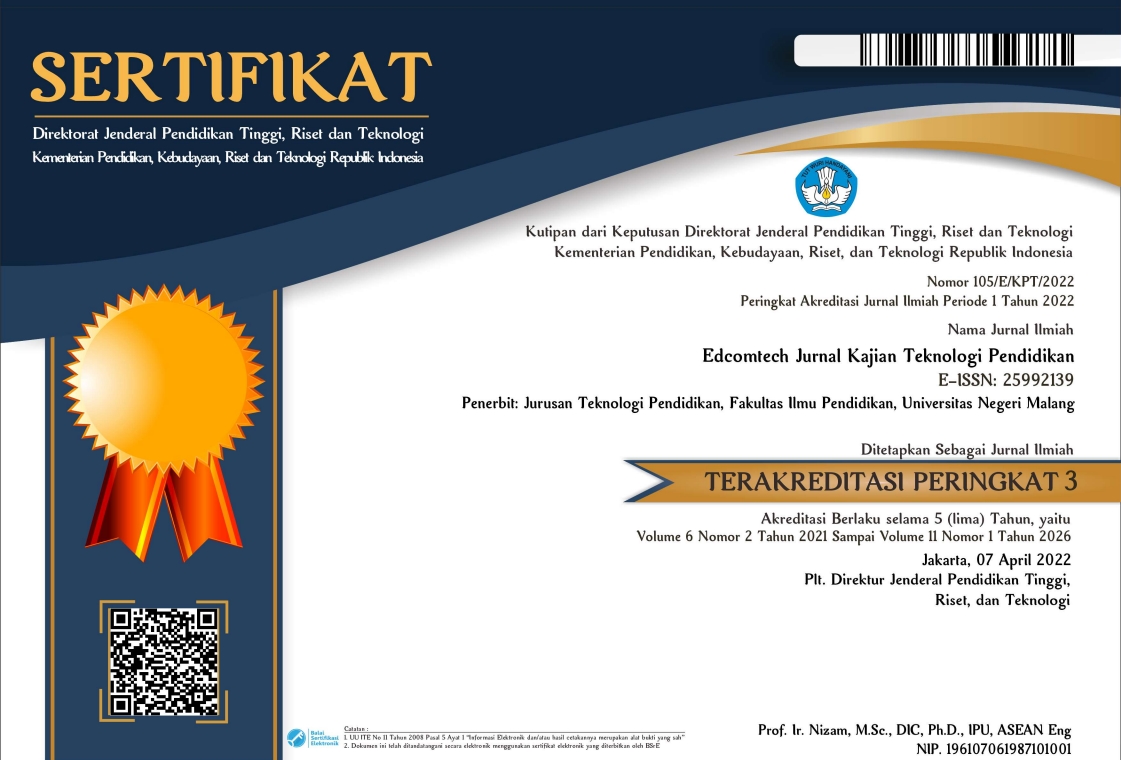Analysis of Acceptance Factor in Education Technology Industry: Case Study of Aku Pintar
Abstract
Abstrak: Penelitian ini di latarbelakangi oleh masih banyaknya salah jurusan yang dialami oleh mahasiswa di Indonesia. Seiring dengan perkembangan teknologi dan karena pandemi COVID-19 yang sedang berlangsung telah mempercepat “New Normal” di bidang pendidikan, kini Edtech telah sampai pada tahap membantu pelajar dalam memilih jurusan sesuai potensi dan minat bakatnya. Guna meningkatkan ketepatan dan kemudahan pelajar dalam mencari jurusan sesuai potensi dan minat bakatnya, maka akan dicari tahu faktor-faktor yang mempengaruhi penerimaan aplikasi EdTech dalam memilih jurusan dengan studi kasus aplikasi Aku Pintar. Namun terdapat berbagai faktor yang belum diketahui mengenai tingkat pencapaian dan penerimaan pengguna Tes Penjurusan pada aplikasi Aku Pintar. Berdasarkan hal tersebut, penelitian ini ingin mengidentifikasi faktor-faktor penerimaan tes penjurusan pada aplikasi Aku Pintar. Penelitian ini menggunakan model keberhasilan informasi yang telah dimodifikasi dengan menambahkan variabel dari rekomendasi penelitian sebelumnya. Pada penelitian ini menggunakan variabel sebagai berikut: kualitas informasi, kualitas sistem, kualitas layanan, kepuasan pengguna, niat menggunakan, dan manfaat bersih. Metode pengumpulan data menggunakan survei online melalui Google Form. Penelitian ini menggunakan metode analisis data dari smartPLS. Hasil analisis menunjukkan bahwa faktor-faktor yang mempengaruhi keberhasilan pelaksanaan tes penjurusan pada aplikasi Aku Pintar adalah kualitas informasi, kualitas layanan, niat menggunakan, kepuasan pengguna dan manfaat bersih.
Abstract: This research was motivated by the high number of wrong majors experienced by students in Indonesia. Along with the development of technology and because the ongoing COVID-19 pandemic has accelerated the “New Normal” in the field of education, it has now Edtech reached the stage of helping students in choosing a major according to their potential and talent interests. To improve the accuracy and ease of students finding majors according to their potential and talent interests, we would find out the factors that influence the acceptance of EdTech applications in selecting majors with a case study of the Aku Pintar application. However, there were various unknown factors regarding the level of achievement and acceptance of Majoring Test users in the Aku Pintar application. Based on this, this study wanted to identify the factors of acceptance of the major’s selection test in the Aku Pintar application. This study used the information success model which had been modified by adding variables from previous research recommendations. The variables used are information quality, system quality, service quality, user satisfaction, intention to use, and net benefit. The data collection method used an online survey via Google Forms. This research used a data analysis method from smartPLS. The results of the analysis showed that the factors that influence the success of the implementation of the major selection test in the Aku Pintar application were information quality, service quality, intention to use, user satisfaction, and net benefits.
Keywords
Full Text:
PDFReferences
Abdillah, W., & Jogiyanto. (2015). Partial Least Square Alternatif Structural Equation Modelling(SEM) Dalam Penelitian Bisnis. Yogyakarta: Andi Publisher.
Chin, W. (1998). The Partial Least Square Approach for Structural Equation Modelling. London: Lawrence Erlbaum Associates.
Chomchalao, S., & Naenna, T. (2013). Influence of System Traits and Personal Traits on the Acceptance of e-Government Service. Information Technology Journal, 12(5), 880–893. https://doi.org/10.3923/itj.2013.880.893
DeLone, W. H., & McLean, E. R. (2003). The DeLone and McLean model of information systems success : A ten-year update. Jurnal Management Information System, 19(4), 9–30. https://doi.org/10.1080/07421222.2003.11045748
DeLone, William H., & McLean, E. R. (1992). Information Systems Success: The Quest for the Dependent Variable. Information System Research, 3(1), 60–95. https://doi.org/10.1287/isre.3.1.60
Ghozali, I., & Fuad. (2014). Structural Equation Modeling Teori, Konsep, dan Aplikasi dengan Program LISREL 9.1 Edisi 4. Semarang: Badan Penerbit Universitas Diponegoro.
Ghozali, I., & Latan, H. (2012). Partial Least Square: Konsep, Metode, dan Aplikasi Menggunakan SmartPLS 2.0 M3. Semarang: Badan Penerbit Universitas Diponegoro.
Hair, J. F., Black, W. C., Babin, B. J., & Anderson, R. E. (2014). Multivariate Data Analysis, New International Edition. New Jersey: Pearson.
Harahap, R. F. (2014). 87% Mahasiswa Indonesia Salah Jurusan.
Mardiana, S., Tjakraatmadja, J. H., & Aprianingsih, A. (2015). Validating the Conceptual Model for Predicting Intention to Use as Part of Information System Success Model: The Case of an Indonesian Government Agency. Procedia Computer Science, 72, 353–360. https://doi.org/10.1016/j.procs.2015.12.150
Prasetyo, A. C. (2017). Analisis Faktor-Faktor Yang Mempengaruhi Stickiness Situs Triptrus.Com. Magister Teknologi Informasi, Universitas Indonesia.
Rahmadani, C. S. M. (2014). Hubungan antara Sense of Humor dengan Stress Akademik pada Siswa Kelas Akselerasi SMA Negeri 1 Bireun. Universitas Medan Area.
Rahmawati, W. K. (2017). Efektivitas Teknik Restrukturisasi Kognitif untuk Menangani Stres Akademik Siswa. Jurnal Konseling Indonesia, 2(1).
Ramayah, T., Ahmad, N. H., & Hong, T. S. (2012). An Assessment of E-Training Effectiveness in Multinational Companies in Malaysia. Educational Technology and Society, 15(2), 25–137.
Stefanovic, D., Marjanovic, U., Delic, M., Culibrk, D., & Lalic, B. (2016). Assesing the Success of E-Government Systems: An Employee Perspective. Information & Management, 53, 717–726. https://doi.org/10.1016/j.im.2016.02.007
Syamsuddin, M. A. (2016). Analisis Faktor-Faktor yang Memengaruhi Efektifitas Sistem Aplikasi Piutang dan Pengembalian (SAPP) di Direktorat Jenderal Bea dan Cukai Kementerian Keuangan. Magister Teknologi Informasi, Universitas Indonesia.
Wang, Y. S., & Liao, Y. W. (2008). Assessing E-Government Systems Success: A Validation of the DeLone and McLean Model of Information Systems Success. Government Information Quartely, 25, 717–733. https://doi.org/10.1016/j.giq.2007.06.002
DOI: http://dx.doi.org/10.17977/um039v7i22022p130
Refbacks
- There are currently no refbacks.
Copyright (c) 2022 Sofian Lusa, Lutvianto Pebri Handoko, Prasetya Gilang Nuswantara

This work is licensed under a Creative Commons Attribution-ShareAlike 4.0 International License.
Edcomtech: Jurnal Kajian Teknologi Pendidikan published by Department of Educational Technology, Faculty of Education, State University of Malang in Collaboration with Asosiasi Program Studi Teknologi Pendidikan Indonesia (APS TPI) and Ikatan Profesi Teknologi Pendidikan Indonesia (IPTPI) with MoU.
Publisher Address:
Lab. Teknologi Pendidikan, Gd.E2, Lt.1
Fakultas Ilmu Pendidikan Universitas Negeri Malang
Jalan Semarang No 5, Kota Malang Kode Pos 65145
Email: edcomtech.fip@um.ac.id
========================================================================================================
| INDEXED BY | TOOLS | PLAGIARISM CHECK | ARTICLE TEMPLATE |
|

Edcomtech is licensed under a Creative Commons Attribution-ShareAlike 4.0 International License.
Edcomtech Statistics (Since July 13th, 2020)












1.png)








